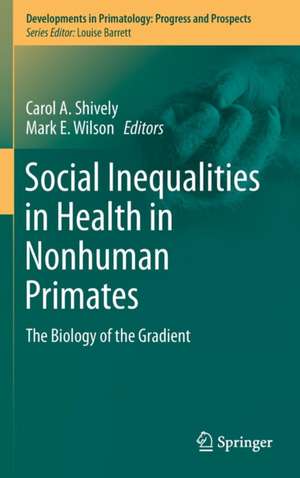Social Inequalities in Health in Nonhuman Primates: The Biology of the Gradient: Developments in Primatology: Progress and Prospects
Editat de Carol A. Shively, Mark E. Wilsonen Limba Engleză Hardback – 29 apr 2016
| Toate formatele și edițiile | Preț | Express |
|---|---|---|
| Paperback (1) | 635.01 lei 6-8 săpt. | |
| Springer International Publishing – 22 apr 2018 | 635.01 lei 6-8 săpt. | |
| Hardback (1) | 641.20 lei 6-8 săpt. | |
| Springer International Publishing – 29 apr 2016 | 641.20 lei 6-8 săpt. |
Din seria Developments in Primatology: Progress and Prospects
- 20%
 Preț: 571.32 lei
Preț: 571.32 lei - 18%
 Preț: 1216.65 lei
Preț: 1216.65 lei - 19%
 Preț: 578.67 lei
Preț: 578.67 lei - 18%
 Preț: 956.69 lei
Preț: 956.69 lei - 18%
 Preț: 948.92 lei
Preț: 948.92 lei - 18%
 Preț: 948.92 lei
Preț: 948.92 lei - 18%
 Preț: 945.79 lei
Preț: 945.79 lei - 18%
 Preț: 962.66 lei
Preț: 962.66 lei - 18%
 Preț: 1664.43 lei
Preț: 1664.43 lei - 18%
 Preț: 1224.54 lei
Preț: 1224.54 lei - 24%
 Preț: 826.26 lei
Preț: 826.26 lei - 24%
 Preț: 802.76 lei
Preț: 802.76 lei - 18%
 Preț: 1562.94 lei
Preț: 1562.94 lei - 18%
 Preț: 950.21 lei
Preț: 950.21 lei - 18%
 Preț: 943.73 lei
Preț: 943.73 lei - 18%
 Preț: 1549.67 lei
Preț: 1549.67 lei - 18%
 Preț: 1248.20 lei
Preț: 1248.20 lei - 18%
 Preț: 941.38 lei
Preț: 941.38 lei - 24%
 Preț: 800.87 lei
Preț: 800.87 lei - 18%
 Preț: 953.35 lei
Preț: 953.35 lei - 18%
 Preț: 1827.48 lei
Preț: 1827.48 lei - 18%
 Preț: 1209.52 lei
Preț: 1209.52 lei - 18%
 Preț: 957.62 lei
Preț: 957.62 lei - 18%
 Preț: 1231.47 lei
Preț: 1231.47 lei - 18%
 Preț: 1225.48 lei
Preț: 1225.48 lei - 5%
 Preț: 1433.83 lei
Preț: 1433.83 lei - 18%
 Preț: 1231.16 lei
Preț: 1231.16 lei - 18%
 Preț: 1226.90 lei
Preț: 1226.90 lei - 18%
 Preț: 955.25 lei
Preț: 955.25 lei - 18%
 Preț: 956.03 lei
Preț: 956.03 lei - 18%
 Preț: 1218.53 lei
Preț: 1218.53 lei - 18%
 Preț: 950.52 lei
Preț: 950.52 lei -
 Preț: 416.82 lei
Preț: 416.82 lei - 18%
 Preț: 1554.89 lei
Preț: 1554.89 lei
Preț: 641.20 lei
Preț vechi: 754.36 lei
-15% Nou
Puncte Express: 962
Preț estimativ în valută:
122.73€ • 133.36$ • 103.16£
122.73€ • 133.36$ • 103.16£
Carte tipărită la comandă
Livrare economică 21 aprilie-05 mai
Preluare comenzi: 021 569.72.76
Specificații
ISBN-13: 9783319308708
ISBN-10: 331930870X
Pagini: 178
Ilustrații: V, 178 p. 15 illus., 10 illus. in color.
Dimensiuni: 155 x 235 x 13 mm
Greutate: 0.44 kg
Ediția:1st ed. 2016
Editura: Springer International Publishing
Colecția Springer
Seria Developments in Primatology: Progress and Prospects
Locul publicării:Cham, Switzerland
ISBN-10: 331930870X
Pagini: 178
Ilustrații: V, 178 p. 15 illus., 10 illus. in color.
Dimensiuni: 155 x 235 x 13 mm
Greutate: 0.44 kg
Ediția:1st ed. 2016
Editura: Springer International Publishing
Colecția Springer
Seria Developments in Primatology: Progress and Prospects
Locul publicării:Cham, Switzerland
Cuprins
Introduction: Relevance of NHP Translational Research to Understanding Social Inequalities in Health in Human Beings.- An Introduction to the Female Macaque Model of Social Subordination Stress.- Effects of Social Subordination on Macaque Neurobehavioral Outcomes: focus on Neurodevelopment.- The Effects of Social Experience on the Stress System and Immune Function in Non-Human Primates.- The Influence of Social Environment on Morbidity, Mortality, and Reproductive Success in Free-Ranging Cercopithecine Primates.- Social Status and the Non-human Primate Brain.- Emotional Eating in Socially Subordinate Female Rhesus Monkeys.- Dietary Modification of Physiological Responses to Chronic Psychosocial Stress: Implications for the Obesity Epidemic.
Notă biografică
Carol Shively, Ph.D. Professor PathologyWake Forest School of Medicinecshively@wakehealth.edu(336) 716-1524Mark Wilson PhD, ProfessorDepartment of Psychiatry and Behavioral SciencesEmory Universitymwils02@emory.edu
Textul de pe ultima copertă
This book provides a comprehensive look atnonhuman primate social inequalities as models for health differences associated with socioeconomic status in humans. The benefit of the socially-housedmonkey model is that it provides the complexity of hierarchical structure andrank affiliation, i.e. both negative and positive aspects of social status. Atthe same time, nonhuman primates are more amenable to controlled experimentsand more invasive studies that can be used inhuman beings toexamine the effects of low status on brain development, neuroendocrinefunction, immunity, and eating behavior. Because all of these biological andbehavioral substrates form the underpinnings of human illness, and are likelyshared among primates, the nonhuman primate model can significantly advance ourunderstanding of the best interventions in humans.
Caracteristici
Analyzes the deleterious effects of social stress, which increases morbidity and mortality from all of the illnesses that most commonly plague humans Focuses on nonhuman primate models, providing easy translation to human health concerns Focuses on social inequalities in health in a species other than our own, emphasizing the biology of social class common to all, not just some races, ethnicities, or levels of education Includes supplementary material: sn.pub/extras















